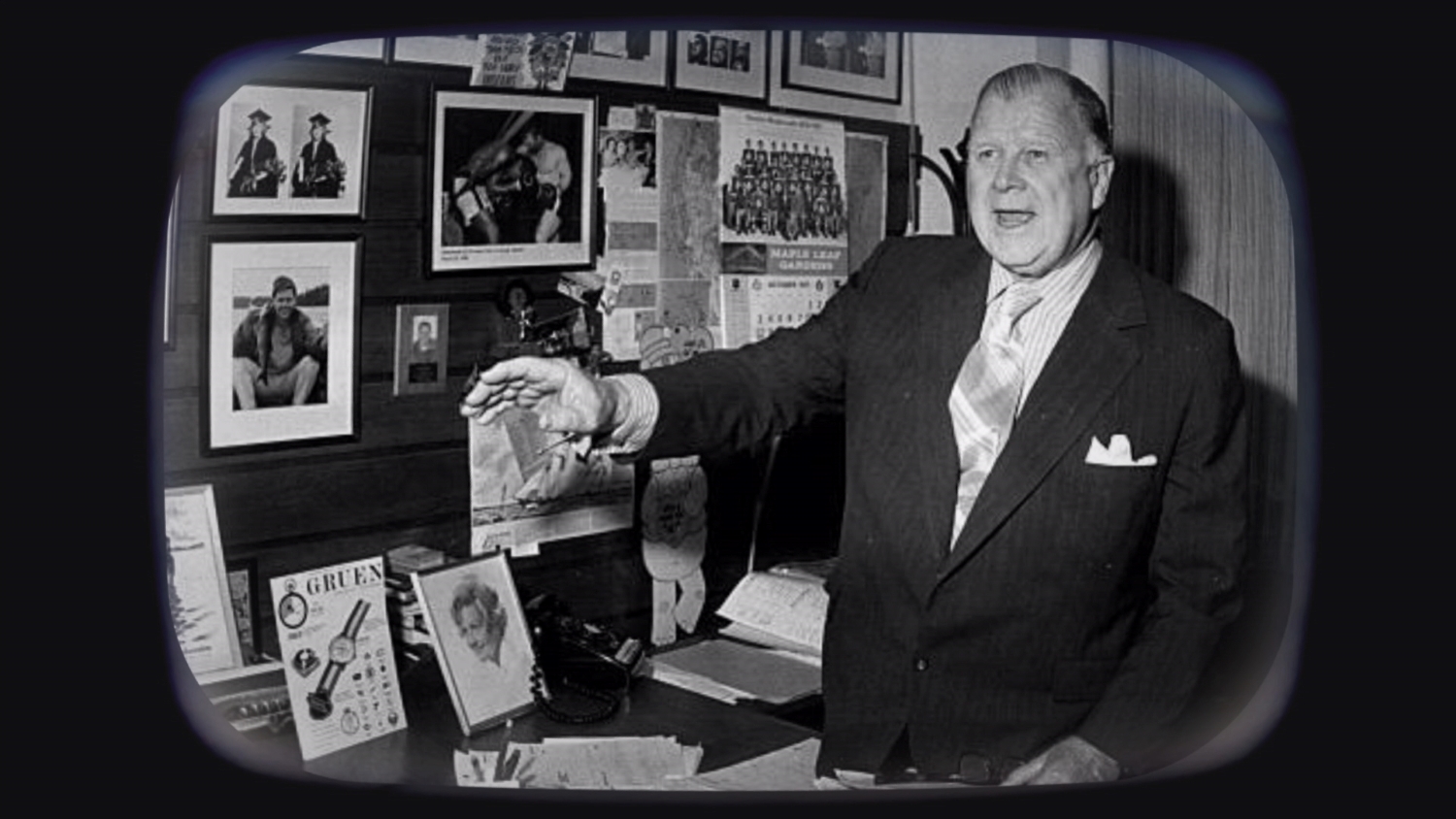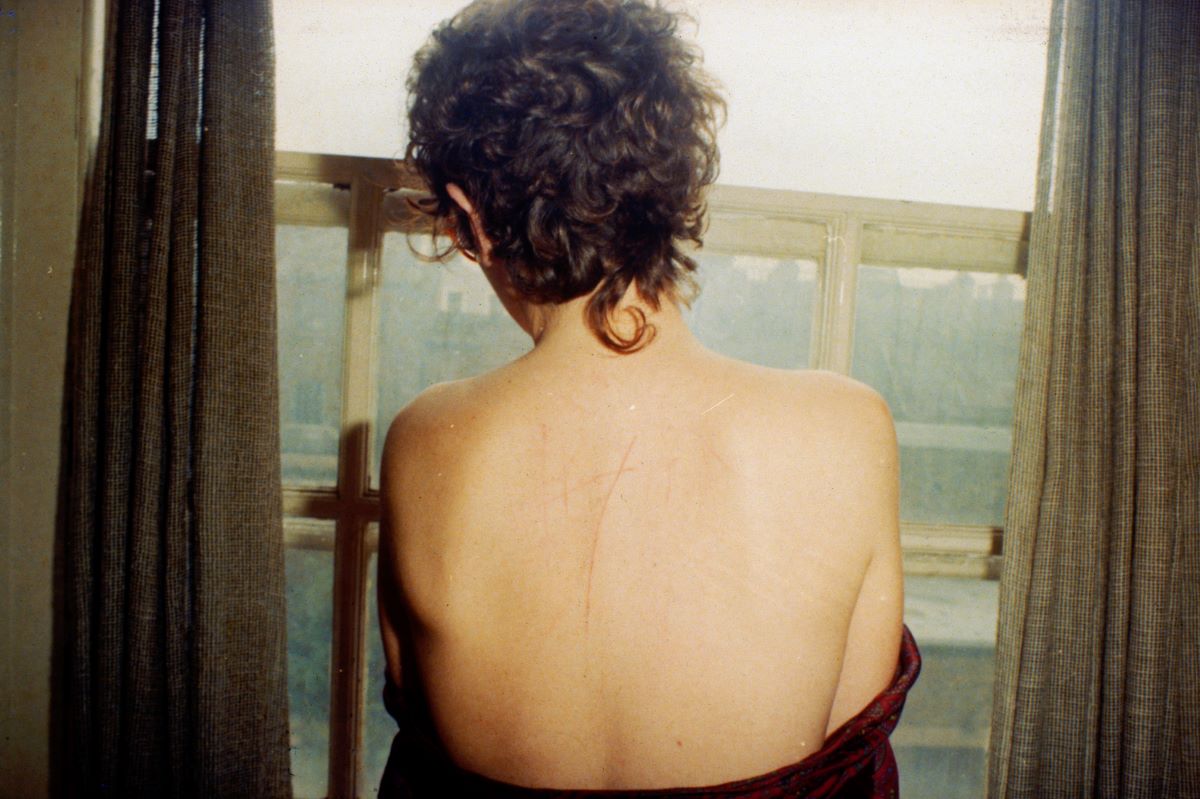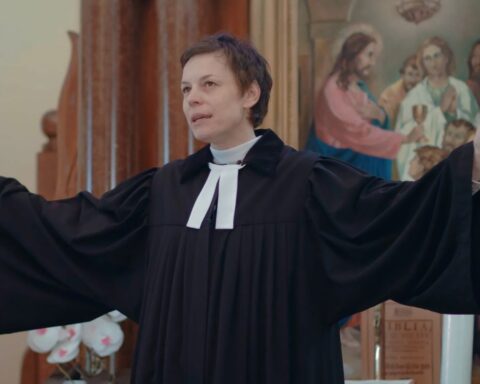Long before it became a Loblaws, Maple Leaf Gardens was Canada’s hockey hub. Offside: The Harold Ballard Story recounts the history of the Maple Leafs’ controversial owner who united Canadians i their hatred for Toronto. Directed by Jason Priestley, the film offers a unique look at Ballard and his mix of shrewd and shady business practices. Drawing upon a wealth of archival material highlighting Ballard’s time in the spotlight in Toronto during the 1970s and ’80s, the film presents the owner in all his shades and colours. Harold Ballard was loud, brash, coarse, crass, and cutthroat, but he also knew how to spin the media, achieve his ambitions, and squeeze whatever buck he could get from his enterprise.
Offside features a chorus of talking heads who illuminate Ballard lore. Through interviewees like Don Cherry, former Leafs players including Wendel Clark, Darryl Sittler, Rick Vaive, Dave “Tiger” Williams, and former general manager Gerry McNamara, Priestley provides a raucous yet even-handed look at the rise and fall of this sports tycoon. Interviewees tell how Ballard pinched every penny by squishing in more seats, cranked up the heat to sell more drinks, and blindsided top rockers by selling tickets to a second show they never booked. He even transformed part of the arena into a personal suite to shorten his commute.
It’s a colourful character piece about a man well known to generations of seasoned hockey fans, but younger viewers may only vaguely recognize the name that still haunts the franchise. Offside looks back at a pivotal period for one team at the heart of Canada’s game—and illuminates the reason why the Leafs seem destined to perpetually suck.
POV spoke with Priestley and executive producer Michael Geddes ahead of Offside’s world premiere at the Whistler Film Festival.
POV: Pat Mullen
JP: Jason Priestley
MG: Michael Geddes
This interview has been edited for brevity and clarity.
POV: Jason, I read that you are playing Gerry McNamara in an upcoming series about Börje Salming. Is the timing of these projects just a coincidence? How did looking at Ballard’s story and McNamara’s story in different projects inform one another?
JP: It was totally coincidental. We’ve been working on this project for about 18 months. The Börje Salming project came to me this past August, so the timing was totally coincidental. Having spent half a day with Gerry McNamara was incredibly helpful for playing him in the miniseries. When they offered me the part and I talked to the director on the phone, I said to him, “You know I look nothing like Gerry McNamara?” I have to go through hair and makeup every morning, and wear coloured contacts to make myself look like Gerry McNamara every day, but the project’s been fun. Given what’s happened to Börje these last couple of months [he was diagnosed with ALS in July, 2022], it’s nice that we’ve been able to get this project done before his health deteriorated too far. He actually came to the set to visit a couple times. [Salming died the day after this interview.]
POV: Why explore Ballard’s story in 2022?
MG: Nobody had really done the project this way, which is a full-on both-feet-in feature documentary. You have the classic story about a business tyrant and one of Canada’s most important institutions. He had one of the highest offices in the country, and there are generations of people who have only heard rumours and murmurs about him. Everybody who knew Ballard, my age and older, can’t wait to see it. Ten there’s a younger crowd that can’t wait to learn more. That makes for a good project.
JP: We started this project during COVID times and we were still in the Trump presidency. It seemed like a great time to tell a classic story about a classic narcissist, bully, racist, homophobic, xenophobic man who had no filter and had no guardrails around him. A man who was sort of Canada’s Donald Trump before there was a Trump. It seemed like the right time to tell that story and to try to figure out why he was the way he was, and why he made the decisions that he made.
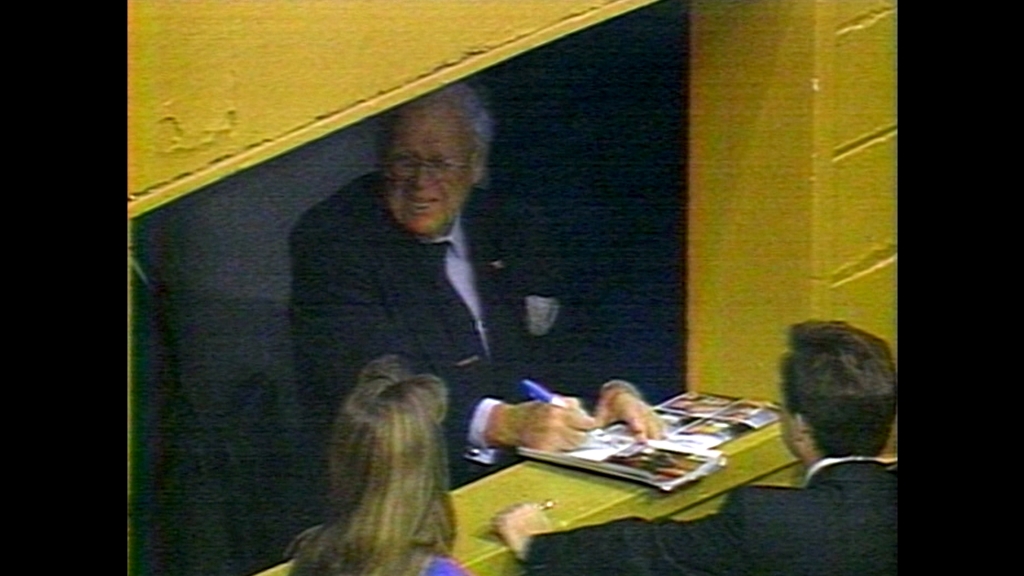
POV: The Trump parallel is effective. What guided the principle to keep the story on Ballard and not insert contemporary references?
JP: To look at Ballard and his behavior through a modern day lens would be difficult and unfair because he didn’t live in 2022. He was of a different time. We tried to keep it as equal as it could be, too. Obviously, we showed the bad sides of Ballard, but we tried to show the good parts of Ballard too—as many as we could find! [Laughs.] There were good parts too. He was a human being.
POV: There’s so much juicy drama to his character, especially in the archival material where you have soundbites that Ballard was giving the media that never made the broadcasts. What was the process of finding those nuggets?
JP: We had researchers going through going through the archives at various places. We compiled all our interviews with all the subjects that we could get a hold of, and they would tell us stories. Then we would backtrack and try to find as much supportive material for those interviews as we could.
POV: Were there any rare finds that you encountered or things that excited you during the research?
JP: We were able to find some stuff that hasn’t been seen before. Hopefully with this documentary, we’ve been able to show people a more complete picture of who Harold Ballard was and what sort of impact he had not only on the Toronto Maple Leafs, but on the Canadian sports world as a whole. It wasn’t just the Maple Leafs that he impacted—it was also the Hamilton Tiger Cats through the mid-Eighties. He had such an impact on Toronto Life. He was responsible for a lot of column inches in the daily papers.
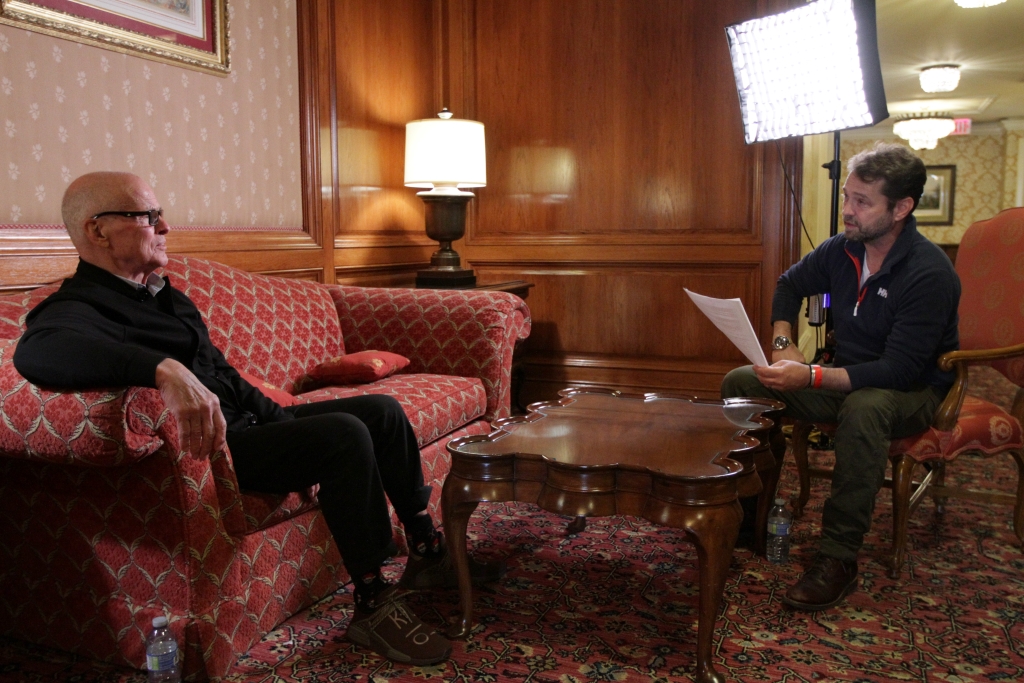
POV: How did you partnership come about, Michael? You have an extensive background in unscripted TV with Pop Stars and You Gotta Eat Here. What drew you to the project?
MG: I like doing things that have never been done. I’ve tried to do that for 25 years in unscripted. I’m a big fan of documentaries personally and it’s a golden age of documentaries, so it made sense for us to veer into this space. We’ve done some versions of docs, but not a straight-up feature doc like this one. There’s no one like Ballard to me. He lived in this time when Toronto was very different and when Toronto didn’t have these outspoken characters. Everybody toed the line and he was a kind of brash American personality who happened to be living in Canada. I think he was one of the first people who figured out how to play the media and played it like a fiddle.
POV: How did you choose your characters to tell the story about someone who’s had such a long career, made so many enemies, and been influential in so many careers?
MG: We got a who’s who to join this documentary. Remember, you’re talking about a controversial figure, so it’s something you have to tread into lightly. I think the players especially might have had second thoughts, but once one goes in, the next one can if they have a positive experience. I’m sure they did their homework. Jason did a great job interviewing everybody, but to get that list, I don’t think anything’s been assembled like this where people came to talk about their boss. The media figures and journalists that we talked to were pretty unified in their response and their feelings towards Ballard because they were always at war with him. But they were wise to the fact that he made their job easy. He gave them words and sentences and columns to write almost every day with his behaviour. It was a love-hate relationship with the media, but the players understood him. They knew the kind of owner that he was, and I think they had to act accordingly.
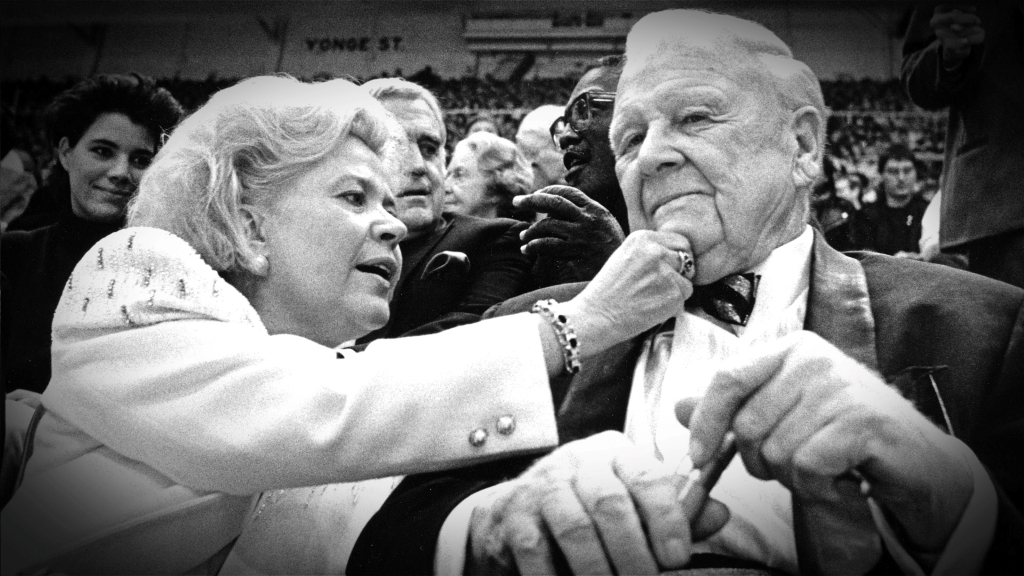
POV: How did it work with the family? Were they approached to be in the film?
MG: We wanted the family to be involved. They weren’t involved at all with any other media. They gave it a long think and they respectfully declined—but not for trying. As far as access to the family archive, we did what we could, but it’s not like we had access to the inner circle of the Ballard family, which is unfortunate. I think we did a good job despite that fact with how Jason put it together
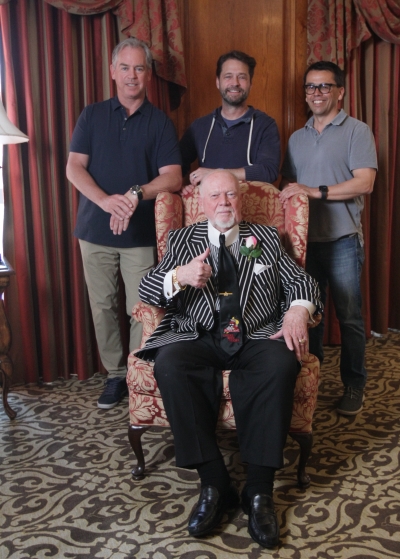
POV: There’s so much public material and so much of their family life played out in the public eye, anyway. Jason, how was interviewing Don Cherry?
JP: Don is Don, right? He’s never at a loss for words. He’s a character and always has been.
POV: Did you get any input on his wardrobe?
JP: Nobody ever gets any input on Don’s wardrobe. Don wears what he wants. [Laughs.]
POV: You previously made the Barenaked Ladies doc Barenaked in American. What different creative challenges are entailed in making a film about someone who is no longer living?
JP: There are no second chances, right? There weren’t really any second chances on Barenaked in America, either. I had my film unit and I was following Barenaked Ladies on the road for two weeks. What I got is what I got. Then I had a couple of days to interview the guys about what I saw, and then for the rest of it, I was in an editing suite for a year trying to put it all together. This movie, Offside, was a much more traditional documentary in that I needed researchers digging through mountains of archival footage.
POV: What do you think has changed most about hockey in the decades since Ballard’s time?
JP: It’s a much more corporate endeavor now. If you look at the ownership of the Toronto Maple Leafs, back in the Seventies and Eighties, it was owned by Harold Ballard. Now you look at the corporate structure and it’s owned by MLSE [Maple Leaf Sports & Entertainment], which is run much more professionally. If you look back when the NHL was a league of six teams, or even a league of 12 teams, there were more individuals or families that owned teams. Now it’s way bigger and the leagues are run differently. The teams are run differently. The NHL’s all grown up now. Back in the old days, a lot of the teams and franchises were mom and pop organizations, but it’s not that way anymore.
MG: There’s a point in the documentary where it’s clear the NHL through the Seventies and Eighties was transforming itself from an old boys’ club of owners to something more corporate and well-oiled. You could say Ballard didn’t get that memo. He was stuck in the past. It was clear to us that he wanted to run unchecked. I think that might be the biggest change from a corporate ownership point of view.
He was 68 years old when he assumed full ownership of the lease, so he was in his twilight years. Ballard was from the past. He didn’t want to leave the past and brought people into this team from his past when, in fact, hockey had passed him by.
Offside has its world premiere at the Whistler Film Festival on December 3 and streams December 5 to January 2.




